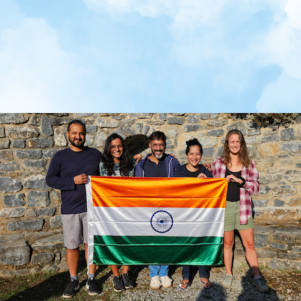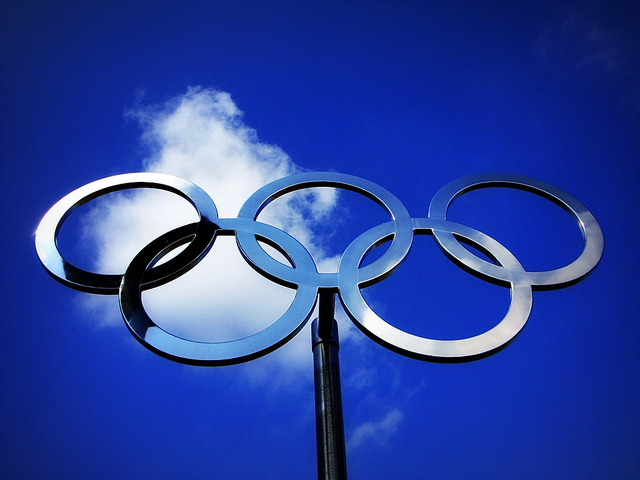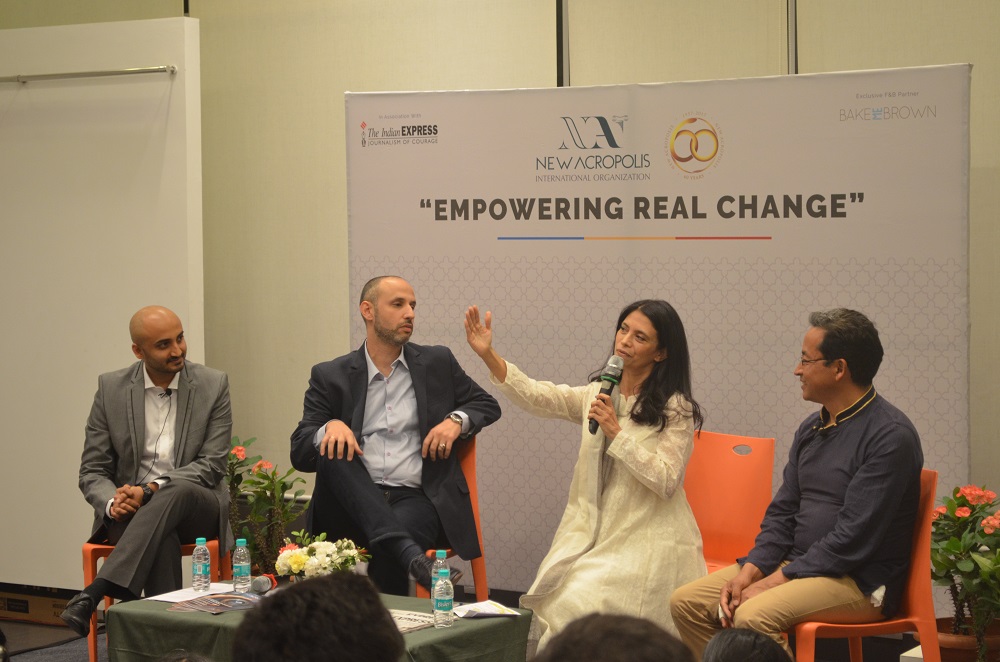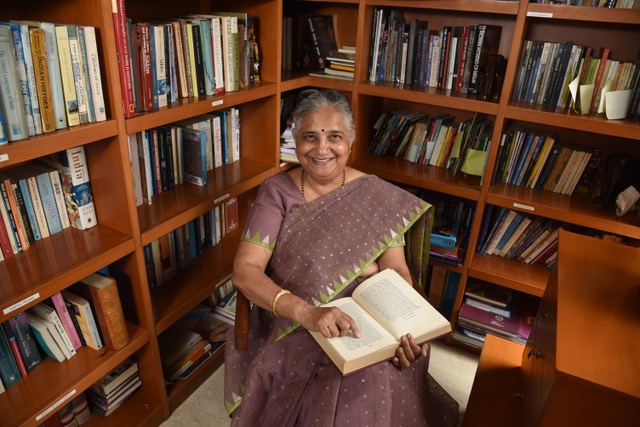Building Values of the Olympic Spirit
Article By Shruti Chopra
 Some of us from New Acropolis (India North), along with 17 other countries came together to take part in the 8-day long, Philosophical-Sports Pre-Season event in Greece. But what is a Pre-Season about? How does New Acropolis, a School of Philosophy connect with the School of Sports? What does it mean to be a Philosopher-Athlete that practices the values of the Olympic Spirit?
Some of us from New Acropolis (India North), along with 17 other countries came together to take part in the 8-day long, Philosophical-Sports Pre-Season event in Greece. But what is a Pre-Season about? How does New Acropolis, a School of Philosophy connect with the School of Sports? What does it mean to be a Philosopher-Athlete that practices the values of the Olympic Spirit?
I’m an (almost) two-year old member at New Acropolis and this would be the first time I would be meeting other Acropolitans from around the world – over 220 of them, so I guess it was natural that I had all this inquisitiveness.
Our eight days were divided into two locations – four days at the International Olympic Academy (IOA) in Olympia and four days, the Greek Acropolitan rural centre, Agios Mamas.
The Journey Begins
Accompanied by four senior Acropolitans from India; Ubai, Samarth, Axelle and Sheetal, we arrived in Athens and were picked up by bus along with other Acropolitans.
The journey to the IOA was around 5 hours with a couple of stops along the way. It was during the journey that I got a small chance to interact with other Acropolitans who represented their countries. Everyone was happy and shared the wonder with me.
Passing through some beautiful villages, along with watermelon, apricot and olive farms, we arrived at the International Olympic Academy where we soaked in the manicured lawns, the huge pine trees, and views of the mountains that appeared so close! The air was crisp and our rooms were immaculate. It was time to unpack, and get organised for the adventure ahead.
Day one ended with dinner at the community dining hall, but with an early morning Opening Ceremony the next day, it was wise to get into bed early and so I did.
A Ceremonial Start
There were over 220 of us, standing in a huge circle on the main grounds of the academy, at the centre of which, the Acropolitans of Greece presented a theatrical performance that felt very true to the essence of what an authentic ceremony should feel like – uplifting and unifying. All of us, who barely knew each other, were part of something together. This laid the foundations of what sports with a philosophical heart means – something we would explore and discover in the days ahead.
We were divided into six groups – each group was named after a Greek God. I was in Hermes, but there was Niké, Kairos, Mnemosyne, Athena and Prometheus. These would be our groups till the very end.
It was in these groups that we would have the opportunity to learn the principles of various sports and play them too, allowing us to experience a sport through the values of it represented. Now what does this all mean?
This is where the lectures helped us.
Lectures Matter
The first lecture was about the Origins of the Olympic Philosophy or Olympism. There were five original values of the Olympic Philosophy: Respect, Fair-Play, Pursuit of Excellence, Balanced Mind, Body & Will – but the one that stayed with me throughout these eight days, and still does, is, Joy in Effort. I’ll share the ‘why’ a little later on.
What many of us discovered through these lectures was that Philosophy and Sports coming together isn’t about breaking records, but being able to work with oneself, bringing focus, through joy, discipline and determination. We all have our own barriers, our own sometimes self-imposed limitations, and it’s about pushing through these, and realising that we have so much more within, if we didn’t hold ourselves back.
This isn’t just a sport, but the game of life and the choice of how to act is ours.
Connecting with a lot that was shared was easy, and through the eight lectures, we were all able to bring something back with us, that we could work on in our own lives.
For example, living with the spirit of Areté – which is a strong posture that comes from within, a posture that is reflected through generosity and love; such as an expression of will as an athlete works through their pain but is in charge of themselves. Many of us work through our pain, and we do get through. But the question remains of whether we managed to do this through generosity and love? Or could we have done better in this aspect?
The theory part was great, but were we able to put it into practice?
Philosophy & Sports: The Practice
We were introduced to many sports, such as volleyball, athletics, football, swimming, a newly invented sport for athletes. But we also had the opportunity to play table tennis and ultimate frisbee in the free time we had. We absorbed every experience possible despite the fluctuating weather conditions – yes we played in the rain, heat and cold! It was all there, challenging us. But what we drew from all the sports was the value of rhythm.
Not just rhythm in how we moved, but also how we were breathing, and how we coordinated with our other team mates. A consistent, healthy rhythm allowed us to keep the volleyball in play, or helped us achieve a smooth transition as the relay race baton moved from one athlete’s hand to the next.
Being present, putting in that effort, problem solving, saw us grow and lift our fellow teammates and even the opposition. There was harmony and genuine encouragement.
Samarth shared his insight, that “Sports is one of the branches of a big tree. If we look at this branch as a means to develop ourselves and realise our potential then it is something that can create a good impact for the whole tree.”
I believe our visits to various ancient sites also had some role to play in this.
Visiting What Once Was, and Still Remains
Just three kilometres away from the International Olympic Academy was Olympia, the place where the original Olympic games were held. What once had training areas, temples of Zeus and Hera along with a stadium, was now mostly in ruins. But what was still alive were the stories they carried within them – of heroism, facing challenges and of sacredness.
For many of us, it held encouragement for the present and hope for the future. It opened us up to the ancient ways of thinking, where an endeavor was made sacred by engaging the body, mind and spirit, where ethics was prized above victory, and where victory was rewarded with no material gain whatsoever, but a simple laurel wreath.
The fun part was when almost everyone, in turns, took part in a 192 metres race at the ancient stadium of Olympia – yes, it was an Olympic race, but it was a race without competition, a race with joy.
I didn’t feel like a spectator of what was, but what is possible.
This experience only grew when, we eventually ventured to Delphi.
Believed to be the naval of the world by the Ancient Greeks, Delphi was a personal favourite. The dedication of the athletes who undertook the arduous journey, of walking for days or weeks, then climbing up a high mountain to compete in the Pythian Games was inspiring.
The journey for us at Delphi began at the Temple of Apollo, which led to the spectacular theatre and then a further trek up to the stadium. Many of us were out of breath at the end of this serpent-like steep climb, but what most wondered was, why did the temple come first and the stadium last.
As we stood at the top, this discussion grew. One idea that most connected with, after experiencing the trek up, was the games may have been so revered that the Greeks gave it the highest place symbolized by the laurel crown which was seen as sacred and represented unity.
Delphi was special for those sportsmen who experienced this journey as a pilgrimage; just as we were asked to do as philosopher-athletes.
And there was something special about Delphi that made you wonder – how did they build all this, so high up, with so much thought and precision?! I guess similar questions are asked about the Pyramids in Egypt.
Standing at Delphi, I remembered my teacher telling us about the inscription at the Temple of Apollo “Know thyself and you shall know the universe and the gods”, it felt so apt. It was a reminder to dig deeper within to be able to know life better.
Two days later, we had our final day trip to Nemea & Corinth where Nemean & Isthmian Games were held every two years. With 40,000 people turning up, these games were a great melting pot for philosophers, traders, poets and of course the athletes.
The games provided an opportunity to face trials head-on and overcome them, leading to the awakening of the hero within each person.
So whether it was Olympia, Delphi, Nemea or Corinth, we all had a place we connected with. A place that helped us feel the merging of philosophy and sports.
What was beautiful about the groups we were in was when we met almost every night and shared our experiences.
Reflective Evenings
We spoke of what we felt, what challenges we faced and what we were looking to overcome. We saw how sports, so effortlessly reflected the trials of life and we so effortlessly managed to discover more about ourselves, individually, and as a unified entity because we found Joy in Effort.
Each one of us, from around the world entered these 8 days with our own inhibitions and we all worked on overcoming this.
Personally, I found that I was able to find joy whether I participated actively, or whether I helped with strategies and unification of our teams. My physical capacity did not define the value I could provide and this gave me immense confidence.
Although, I have to admit that when I was able to play ultimate frisbee, volleyball and table tennis – it was fun! But the perspective of standing outside, and having a broader view helped me to learn that this too is important – just as the wind is invisible and helps support the flight of a bird, there is a role to play for all those elements that don’t appear so obvious, yet help us move up.
Axelle too shared her connection with Joy in Effort when we showed up to practice other sports despite it being our rest time, and without compromising on what we were there for. She says, “We knew, that we weren’t doing it for ourselves, there was no medal to win, nor any other reward, but to really understand through experience, what it means to be a Philosopher-Athlete practicing the values of the Olympic Spirit. It was our way to push the limits and create an experience that time couldn’t take away ever, and that will stay in the hearts of each of us!”
I end with one last, but important experience to share. We spent four days at Agios Mamas, the Greek Acropolitan rural centre. It was an incredibly enchanting place inside a forest. With over 220 of us, along with many Greek Acropolitans hosting us – cooking, cleaning and taking care of us all, I was witness to the fraternity that I experience here in India, but at a scale I couldn’t imagine.
As I write this, it does feel too perfect, but that’s what the experience was.
We travelled back to India with our stomachs chock-full of the wonderful food we had eaten, our hearts brimming with the love and joy we had experienced, and our spirits, uplifted with the inspirational ideas and principles of Olympism!
The entity posting this article assumes the responsibility that images used in this article have the requisite permissionsRead the original article on https://theacropolitan.in/2024/10/31/building-values-of-the-olympic-spirit/
Permissions required for the publishing of this article have been obtained




What do you think?